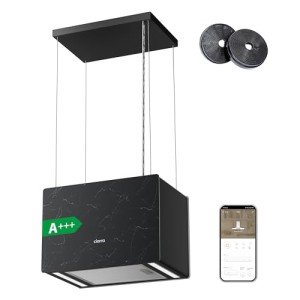10 Signs To Watch For To Get A New Extractor Fan For Island Hob
페이지 정보
본문
The Essential Guide to Extractor Fans for Island Hobs
In modern kitchen areas, the island hob has emerged as a standout function, acting as a centerpiece for culinary creativity and celebrations. Nevertheless, with the arrival of open-plan home, Over Island Extractor Fan the need for efficient ventilation ends up being crucial. An extractor hood for island fan for an island cooker extractor hood hob is not just a high-end; it's a need. This article will explore the reasons you need to think about installing an extractor fan, the types readily available, their functions, and the very best practices for installation and maintenance.
Why Install an Extractor Fan for Island Hobs?
Island hobs are often located far from walls, making conventional overhead extraction hoods impractical. Here are some essential factors why an extractor fan is important for island hobs:
Air Quality Improvement: Cooking produces smoke, steam, and odors. An extractor fan effectively eliminates these contaminants, causing a cleaner kitchen environment.
Heat Reduction: Extractor fans assist expel hot air, adding to a more comfortable cooking environment.
Defense Against Grease Build-Up: Continuous exposure to cooking fumes can cause grease build-up on surfaces. An extractor fan alleviates this risk.
Visual Appeal: Many contemporary extractor fans are developed to complement kitchen aesthetics, ending up being trendy additions instead of eyesores.
Kinds Of Extractor Fans
When choosing an extractor fan for an island hob, it's crucial to consider the numerous types offered on the market. Here are the most common:

| Type | Description | Pros | Cons |
|---|---|---|---|
| Ducted | These systems vent air outside by means of a duct. | Extremely reliable at eliminating odors and smoke; enhances air quality. | Setup can be complex; requires a path to exterior. |
| Ductless (Recirculating) | Filters air and recirculates it back into the kitchen. | Easier to set up; no external vent needed. | Less reliable in removing smoke and odors; needs regular filter changes. |
| Downdraft | Retractable system positioned behind the hob. | Discreet design; effective for island settings. | Relatively expensive; might not be as effective as conventional hoods. |
| Wall-mounted | Similar to traditional hoods but created to hang over cooker hood island extractor fan for island fan (therkildsen-tange.technetbloggers.de) islands. | Effective and readily available in numerous styles. | Needs appropriate space; can obstruct views. |
Secret Features to Consider
When acquiring an extractor fan for an island hob, there are a number of functions to remember to ensure ideal performance and complete satisfaction:
Suction Power: Measured in cubic meters per hour (m ³/ h), this suggests how efficiently the fan can eliminate air. A higher rating is typically chosen for effective ventilation, especially in big, open spaces.
Sound Level: Measured in decibels (dBA), quieter models are preferable for comfort, particularly in open-plan designs.
Filter Quality: Ensure the fan is equipped with premium filters (e.g., activated carbon filters for ductless models) that can be easily replaced.
Control Options: Look for fans with intuitive controls such as touchscreens, remote controls, or smart functions that allow for smooth operation.
Energy Efficiency: Opt for energy-rated designs to decrease energy usage and long-term expenses.
Installation Best Practices
Installing an extractor fan requires cautious preparation to maximize its efficiency. Here are some vital suggestions:
Positioning: Mount the fan 65-75 cm above the cooking surface area for ideal efficiency.
Adequate Ducting: If selecting a ducted fan, guarantee that ducting is kept straight and as brief as possible to reduce airflow resistance.
Electrical Work: Hire a certified electrical expert to make sure that all electrical connections adhere to safety standards.
Follow Manufacturer Guidelines: Adhere strictly to the setup instructions provided by the manufacturer to make sure security and performance.
Professional Installation: Where necessary, consult professional installers for complex systems, particularly those requiring duct.
Upkeep Tips
To ensure long-lasting efficiency from your extractor fan, regular maintenance is necessary. Think about the following suggestions:

Clean Filters: Depending on use, tidy or change filters regular monthly for optimum air quality.
Examine Ducts: Regularly check ductwork for any clogs or damage and tidy as essential.
Ward off Grease Buildup: Periodically wipe down surface areas to avoid grease build-up.
Use a Soft Cloth: For routine cleaning, use a wet fabric and mild cleaning agent, avoiding abrasive materials.
FAQs
1. How do I pick the ideal size extractor fan?
Identify the needed air flow using the room size. Determine it based upon the kitchen's volume (length × width × height) and increase by 10 to 15 air changes per hour.
2. Are ductless extractor fans effective?
While ductless fans are easier to install, they are less reliable compared to ducted systems. They can cleanse the air however might permit some odors to stick around.
3. Can I set up an extractor fan myself?
It is suggested to seek professional aid for installation, especially for ducted fans, as inappropriate setup can cause reduced performance and security threats.
4. How frequently should I replace extractor fan filters?
For ideal efficiency, change or clean filters every 1-3 months, depending on cooking frequency and the kind of filter.
5. Do extractor fans take in a lot of electrical energy?
Modern extractor fans are developed to be energy-efficient. Examine the energy score before purchase to choose a more cost-effective alternative.
An extractor fan for an island hob not just enhances cooking experiences however also safeguards indoor air quality, adding to a more pleasurable kitchen environment. By thinking about the types readily available, necessary functions, and proper setup and upkeep, homeowners can make educated choices that fit their needs. With the ideal extractor fan, cooking can be a pleasant and over island extractor fan healthy pastime, devoid of concerns about air quality and comfort.

